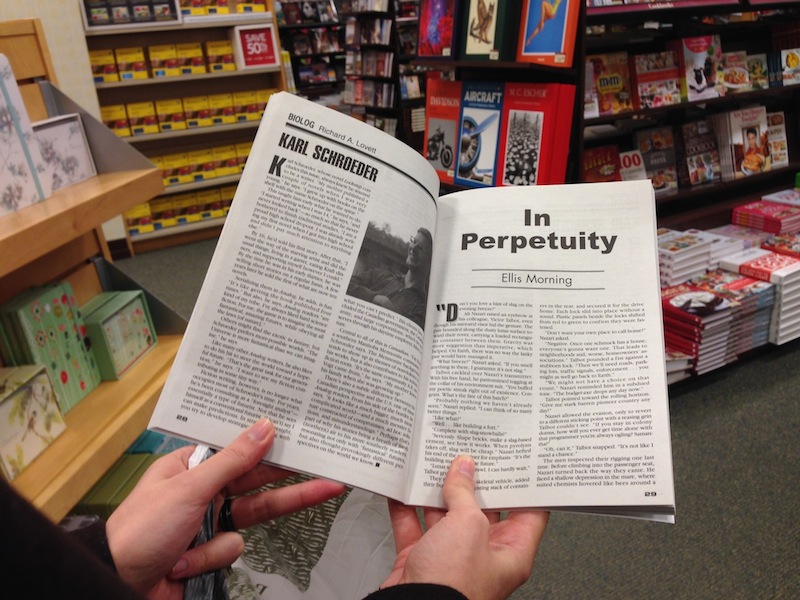Publication for the Unpublished Writer
Seeing our words in print is a dream for a lot of us- maybe even a holy grail at times, impossible to reach.
No matter his age, the unpublished writer feels like a kid fresh out of college, trying to land his first full-time job. Everyone who’s hiring wants someone experienced. How on Earth will he get experience if no one hires him?
Many writers say “screw it” and self-publish. (Heck, I’m doing the same with my novel.) For those who want a traditional publishing credit, what can be done to beef up the resume?
Practice practice practice. I wrote for years and years (and years) before ever attempting to sell anything: fanfic, RPGs, several million abandoned works in progress. They all taught me something. Many of them make me gag now, but that just means I’ve improved in the intervening time. Keep hammering away until you’re a competent storyteller. You must also…
Share your work for critique. “For critique” is the important part. It’s tempting to join friendly fiction communities who greet every story with a barrage of “OMG LOVE IT!” comments- but aside from a fleeting ego boost, you gain nothing. Find people who read with the intent of analyzing what’s good and what can improve. Click here for more thoughts on soliciting the most helpful feedback.
If you’re like me, you may also need to build up your courage to share anything in the first place.
“Looks good. Find it a home.” So said one of my writer’s group colleagues, each time he read something he considered ready for publication. Magazine, website, anthology, free or paid- it’s up to you and your specific goals.
Where the heck do you find them? I used Duotrope to search for publications of my desired genre, story length, payment scheme, etc. Keep an eye out for publications that welcome submissions from first-time authors.
When you find a promising publisher, read their submission guidelines carefully. For instance, “previously unpublished” work means it can’t have been posted anywhere for public consumption, not even on your own personal website. Also ensure your manuscript is properly formatted. If the submission guidelines don’t specify a style, use this formatting guide by William Shunn.
To submit your work, you may need to include a query letter. The query letter is supposed to give the editor (or other deciding party) an idea of how long your submitted work is, whether it’s been published before, and your past publishing experience.
Uh-oh- but you don’t have publishing experience!!
No worries. Just don’t mention it.
For help, here’s the verbatim cover letter that helped get my unpublished butt into Analog Science Fiction and Fact:
Dear [Name of editor in charge of submissions],
I am submitting my short story, “In Perpetuity,” to Analog Science Fiction and Fact for publishing consideration. The story is approximately 6,300 words, and is previously unpublished.
Thank you in advance for your time and consideration. If you require anything further from me, please don’t hesitate to ask.
Sincerely,
Ellis Morning
[full contact details: home address, phone, email]
Should you stop at one submission? Maybe, maybe not. Because of the high-rejection nature of the business, some people shop the same story to multiple publishers at once. It’s up to you whether you have your heart set on a specific publication, or just want it to show up somewhere. Make sure the submission guidelines don’t stipulate against you submitting to multiple publications.
All done with submissions? Time to wait. A lot. It’ll be different everywhere you submit, but several month-long waits are not unheard of. Don’t hammer the publication(s) for updates. If they promise to get back to you in X amount of time, and you don’t hear from them by then, one polite follow-up is OK. Ask if they’re still considering the story, or if you may submit it elsewhere. No further response means “no.” Move on.
They accepted!! Now what? You may receive a contract to sign and return. Fully understand all terms before doing so- look them up, if you have to. What rights do you retain, what rights does publisher receive, and for how long? How will you be compensated? If there’s no formal contract, get as much of this in writing as possible. Both sides should know what the deal is.
After you hand in the contract, a print publication may send a proof of your story- a representation of how it will appear in the magazine, newspaper, etc.- and ask you to review it for mistakes. Do this with great care, as formatting and spelling errors sometimes sneak in at this point.
Once you approve the proof, get ready to wait again! It was about 15-16 months from the time I first submitted In Perpetuity to the time it showed up in print.
What if I’m rejected? Congratulations- you’re a writer! I struck gold with my first short story submission, but I’ve yet to win any literary contest I’ve ever entered. So it goes. It doesn’t necessarily mean your work sucks- the publication might be swamped with submissions, or looking for a specific kind of story to run. If the rejection refers to the story needing more work, though, address its flaws before submitting anywhere else.
Any other tips or tales of first-time publication? Tell me about it in the comments!
